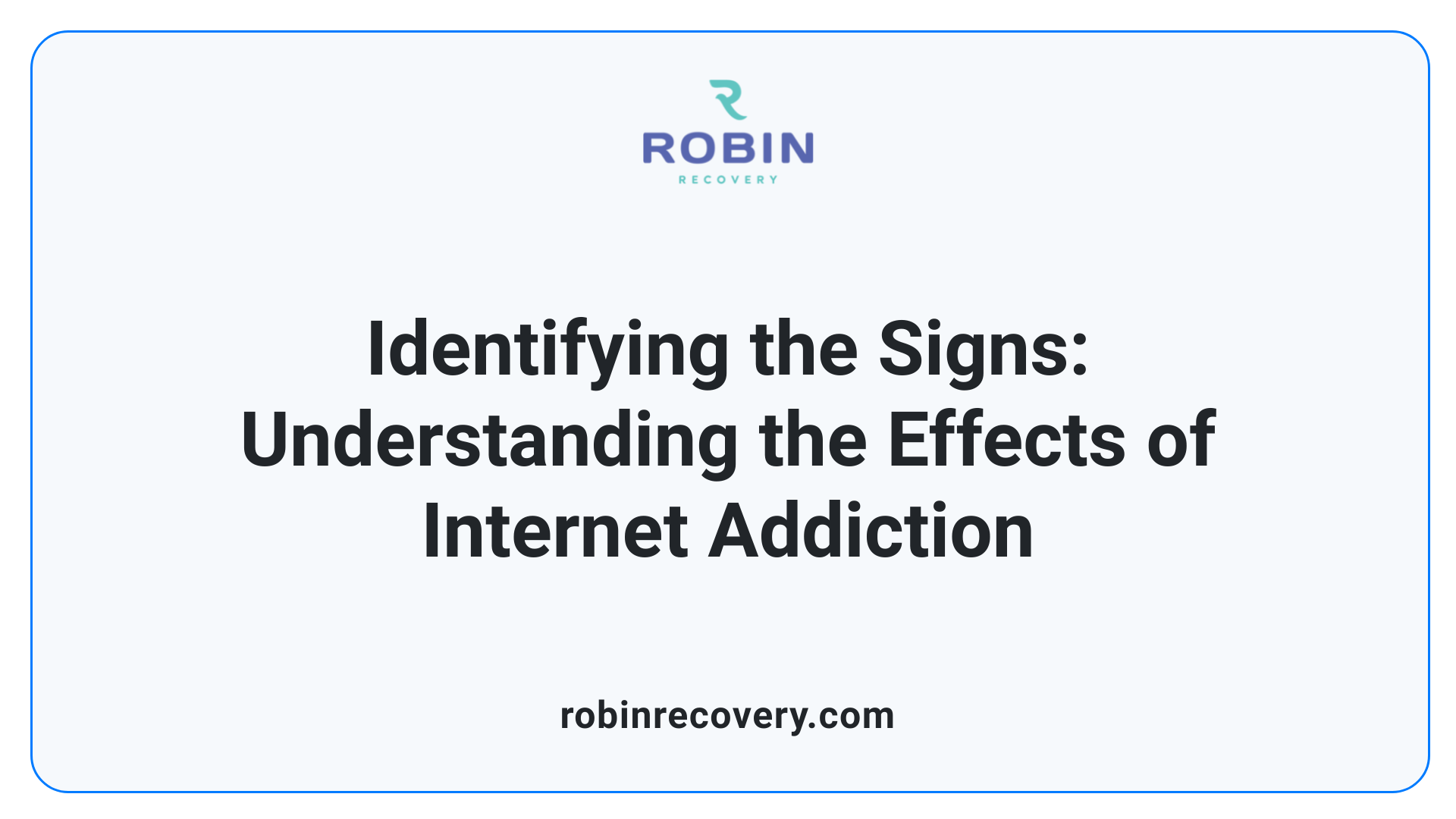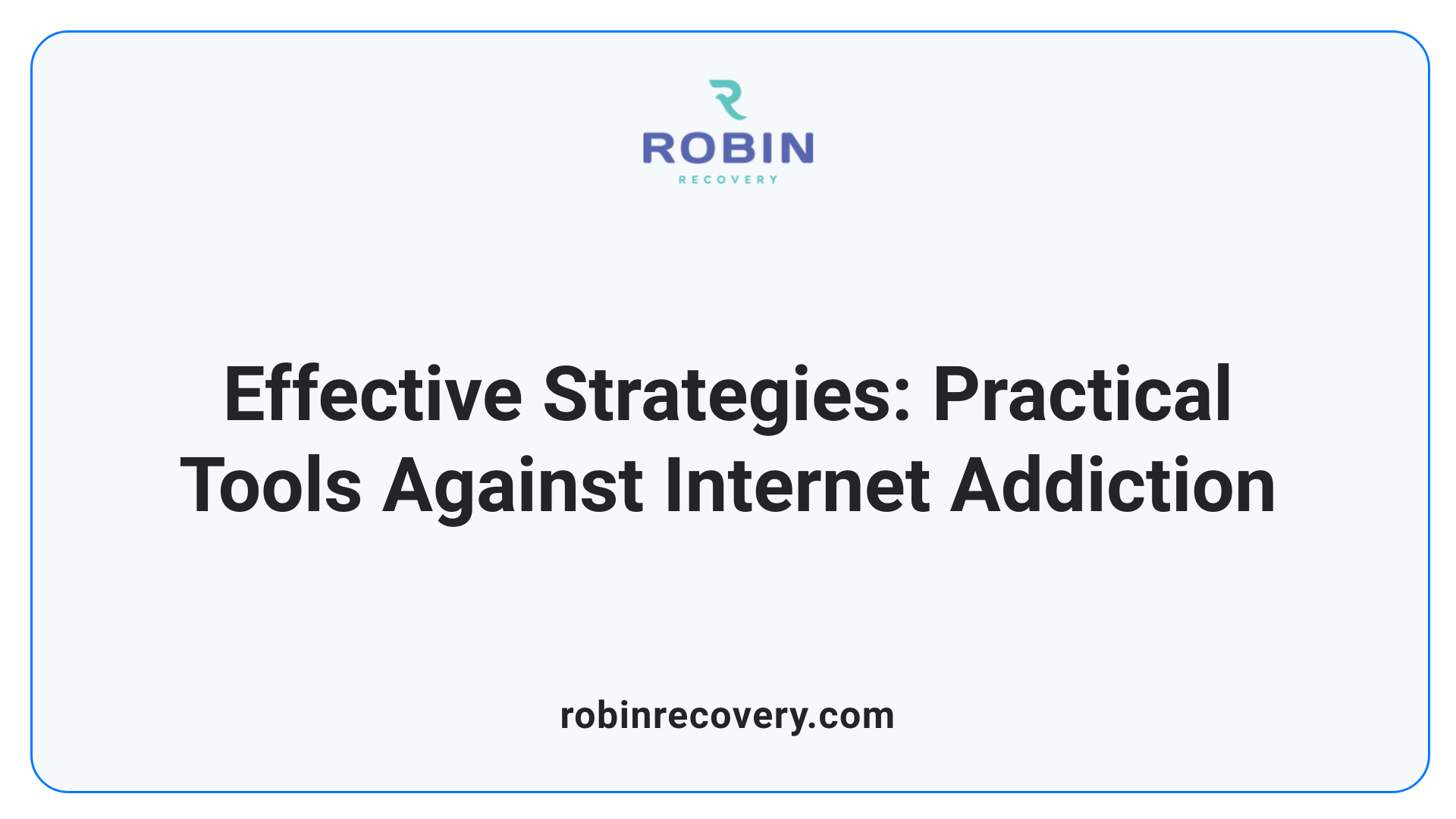How to Stop Internet Addiction

Why Addressing Internet Addiction Matters
Internet addiction is becoming increasingly recognized as a significant issue affecting individuals across various age groups. With the rise of digital technology and the easy accessibility of the internet, many people find themselves spending more time online than intended, leading to negative impacts on their health, relationships, and daily responsibilities. In this article, we will explore the signs and effects of internet addiction, practical strategies for overcoming it, and tips specifically tailored for teenagers. Additionally, we will discuss the broader emotional and psychological impacts of this addiction and explore potential treatment options.
Recognizing the Signs and Understanding the Effects of Internet Addiction

What are the signs and effects of internet addiction?
Internet addiction manifests as a compulsive need to spend excessive time online, significantly affecting an individual’s daily life. Signs of this addiction often include:
- Persistent use: Engaging in online activities despite awareness of negative consequences.
- Increased tolerance: Needing to spend more time online to achieve satisfaction, similar to substance-related behaviours.
- Withdrawal symptoms: Experiencing anxiety, irritability, or mood swings when offline.
- Neglect of responsibilities: Failing to fulfill personal, academic, or professional obligations due to excessive internet use.
The effects of internet addiction can be far-reaching, encompassing personal relationships, work performance, and physical as well as mental health. Common impacts include:
- Physical health issues: Symptoms such as eye strain, poor hygiene, insomnia, and risk of injuries like carpal tunnel syndrome.
- Mental wellness decline: Increased levels of stress and anxiety, alongside potential depression stemming from online behavior.
- Social isolation: Spending excessive time online often results in neglecting face-to-face interactions, impairing the quality of real-life relationships.
Understanding these signs and effects is crucial in developing effective coping strategies and intervention methods, such as cognitive behavior therapy (CBT), aimed at managing internet use more responsibly.
Breaking Free from the Digital Trap

How can someone break free from digital addiction?
Breaking free from digital addiction requires conscious efforts and practical strategies. One effective method is to disable push notifications on your devices. This simple action significantly reduces distractions, allowing you to focus better during work hours.
Establishing a schedule for when to check your devices can help you manage your internet usage and minimize time wastage. For instance, allocate specific blocks of time for online activities and stick to them. This structured approach fosters productivity and helps you reclaim precious time.
Engaging in alternative activities is also crucial. Taking a walk, journaling, or indulging in hobbies can replace mindless scrolling and lead to more fulfilling experiences. These activities not only divert your attention from devices but also enrich your personal life.
Additionally, keeping your phone out of the bedroom at night can dramatically improve sleep quality by preventing late-night distractions. Finally, set clear expectations with colleagues and family regarding your email responses. This reduces the pressure to remain constantly connected, allowing for healthier boundaries and a more balanced life.
Practical tips for managing internet usage
- Set Device-Free Zones: Designate specific areas in your home, like the dining table or bedroom, where devices aren’t allowed to encourage in-person interactions.
- Use Productivity Tools: Applications that track and limit internet use can help keep habits in check and promote mindful browsing.
- Create a Master Schedule: Outline both work and leisure times, ensuring a healthy balance between online and offline activities.
- Identify Triggers: Be aware of situations that prompt excessive internet use, like boredom or stress, and develop healthier coping mechanisms.
- Engage in Social Activities: Join clubs, exercise groups, or community events to foster real-life connections and reduce reliance on online interactions.
By implementing these strategies and tips, individuals can effectively reduce internet dependency and regain control over their time.
Practical Strategies to Overcome Internet Addiction

What practical strategies can help overcome internet addiction?
Overcoming internet addiction can be challenging, but several practical strategies can support individuals on their journey to regain control.
Seek Professional Support
Consulting a healthcare provider or therapist can provide essential guidance. Professionals can facilitate discussions that address not only the addiction but also underlying emotional issues. Cognitive-behavioral therapy (CBT) has proven effective in helping individuals manage their internet use positively.
Develop Offline Interests
Engaging in offline activities is key to reducing internet dependence. Discovering new hobbies, such as sports or arts, can instill a sense of fulfillment that may otherwise be sought online. This not only enriches personal life but also encourages socialization with friends and family, fostering supportive relationships.
Maintain a Healthy Lifestyle
A balanced routine promotes overall well-being. Regular meals and adequate sleep are vital; such habits tend to crumble with excessive internet use. Mindfulness practices can enhance self-awareness, helping individuals recognize triggers that lead to excessive online engagement.
Summary of Key Strategies
Strategy Description Benefits Professional Support Consult a therapist or healthcare provider for guided insights. Address underlying issues and develop coping mechanisms. Offline Interests Engage in sports, arts, or other hobbies outside the internet. Reduced dependency; enriched social interactions. Healthy Lifestyle Maintain regular meals, sleep, and mindfulness. Improves overall health and self-control over internet habits.
Implementing these strategies can provide individuals with a balanced approach to managing their internet use, promoting a more fulfilling offline life.
The Journey of Managing Internet Addiction

Can Internet Addiction Be Cured or Is It Something That Needs Ongoing Management?
Internet addiction can indeed be managed and treated through various therapeutic approaches. Cognitive-behavioral therapy (CBT) is recognized as one of the most effective methods. It assists individuals in developing healthier internet usage habits while helping to address the underlying psychological issues that may contribute to their addiction.
For some individuals, significant improvements can be achieved, allowing them to use the internet responsibly. However, many may find that ongoing management is essential to prevent relapse into old habits. Consistent self-monitoring, coupled with support from friends, family, or support groups, can play a critical role in maintaining a balanced relationship with technology.
Ongoing Support and Management
Recognizing that recovery from internet addiction is often a personal journey is vital. Ongoing support mechanisms, such as attending support groups, promoting engagement in offline activities, and setting periodic goals, can bolster an individual’s ability to navigate their internet use effectively.
Creating a structured schedule that includes designated times for internet use, along with mindful practices to identify triggers, can help prevent excessive engagement online. By adopting a comprehensive approach—embracing both therapeutic methods and everyday management strategies—individuals can reclaim more control over their lives in a technology-driven world.
Helping Teenagers Navigate Technology Addiction

Engaging in Offline Activities
Engaging teenagers in offline activities is essential for reducing their dependence on technology. Outdoor sports, arts and crafts, or group hobbies can provide fulfilling alternatives to screen time. Teens can also be encouraged to spend time with friends in person, fostering real-life social interactions that help alleviate feelings of loneliness often driven by digital connections.
Creating Manageable Screen Time Plans
Creating a practical plan for managing screen time starts with small, achievable changes. One effective method is to develop a schedule that specifies when and how long to use devices. For instance, setting specific times for homework, relaxation, and free time can help strike a balance. Encourage teens to monitor their internet usage and disconnect during family meals or before bedtime.
Recognizing signs of addiction, such as irritability when devices are unavailable, is crucial. If excessive technology use becomes a major issue, it may be time to seek professional help, emphasizing the importance of mental health alongside digital habits.
Exploring Emotional and Psychological Aspects of Internet Addiction
Emotional Health
Understanding emotional health is crucial in addressing internet addiction. Feelings of loneliness or anxiety can drive individuals to seek connections online. This reliance on the internet as an emotional support mechanism may lead to a cycle of addiction, where online interactions replace meaningful real-life relationships.
Psychological Impacts and Underlying Factors
The psychological impact of internet addiction can be profound, affecting an individual’s mental well-being significantly. Symptoms such as mood swings and irritability when offline may arise. Factors contributing to internet addiction include parental oversights during childhood, high stress levels, or underlying mental health conditions like depression and anxiety. Individuals might engage in internet use to temporarily alleviate negative emotions, deepening their reliance and disrupting daily responsibilities.
Addressing these psychological factors through therapy or support groups can equip individuals with the tools to combat this addiction.
Steps Towards a Healthier Digital Lifestyle
Addressing internet addiction is not a simple task, but with the right mindset and strategies, individuals can regain control over their internet usage. From recognizing the signs and seeking professional help to implementing practical strategies and focusing on offline activities, overcoming internet addiction is possible. By understanding the emotional and psychological aspects involved, we can better support ourselves and others in this journey towards a balanced digital lifestyle. Remember, moderation is key, and setting boundaries is essential for maintaining healthy technological interactions.
References
- How to Beat Internet Addiction - Massachusetts General Hospital
- How to Stop Internet Addiction - Enlightened Recovery
- Internet Addiction - Student Health Services
- How to Stop Internet Addiction (with Pictures) - wikiHow
- 12 steps to overcome Internet addiction
- How to Stop Internet Addiction | Enterhealth
- Internet Addiction - Duke Personal Assistance Service
- 5 Types Of Internet Addiction - Get Help Today
